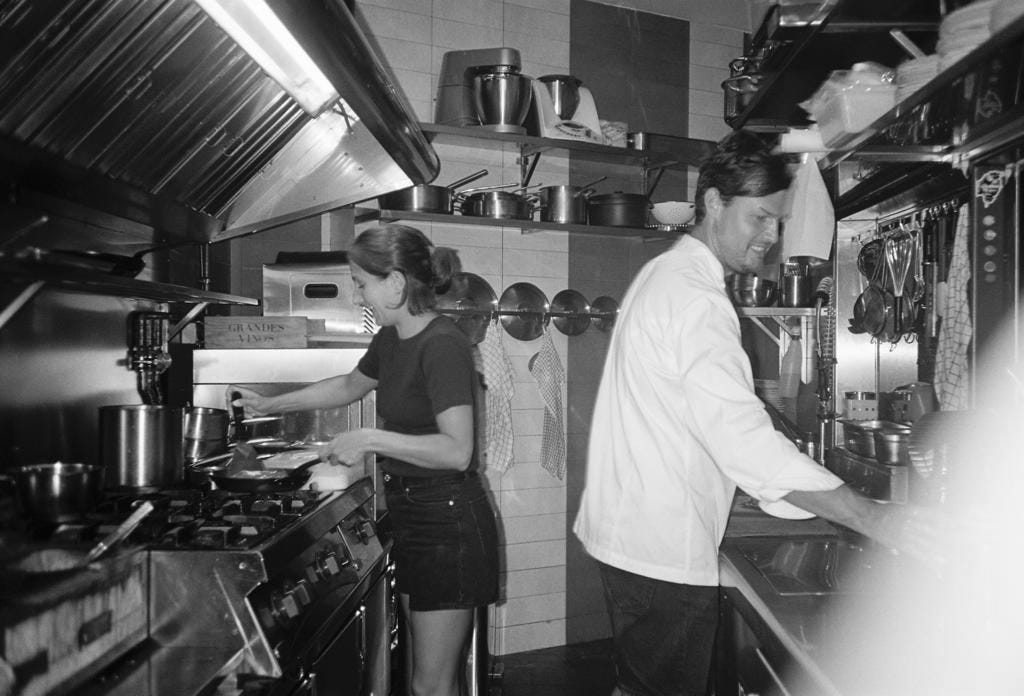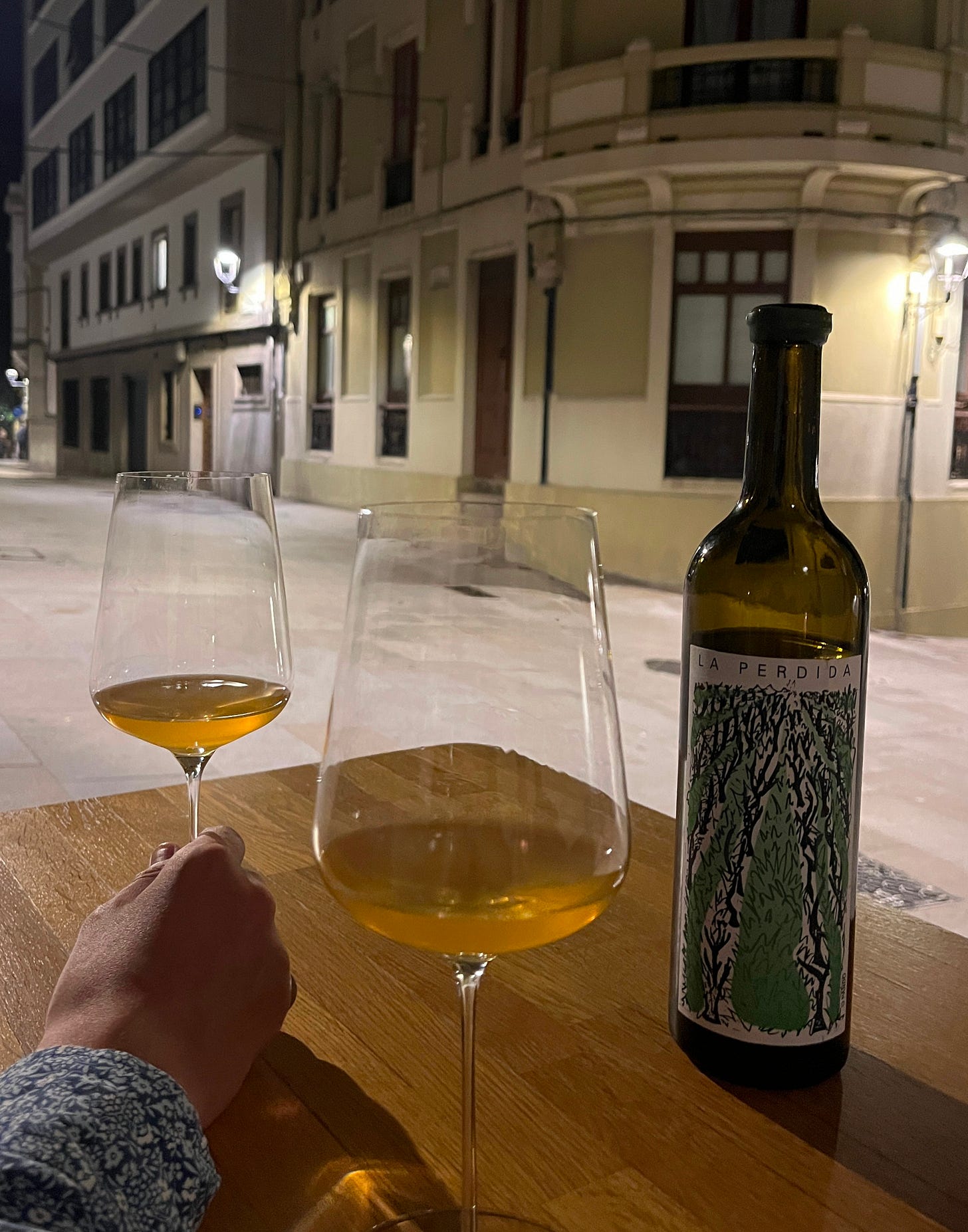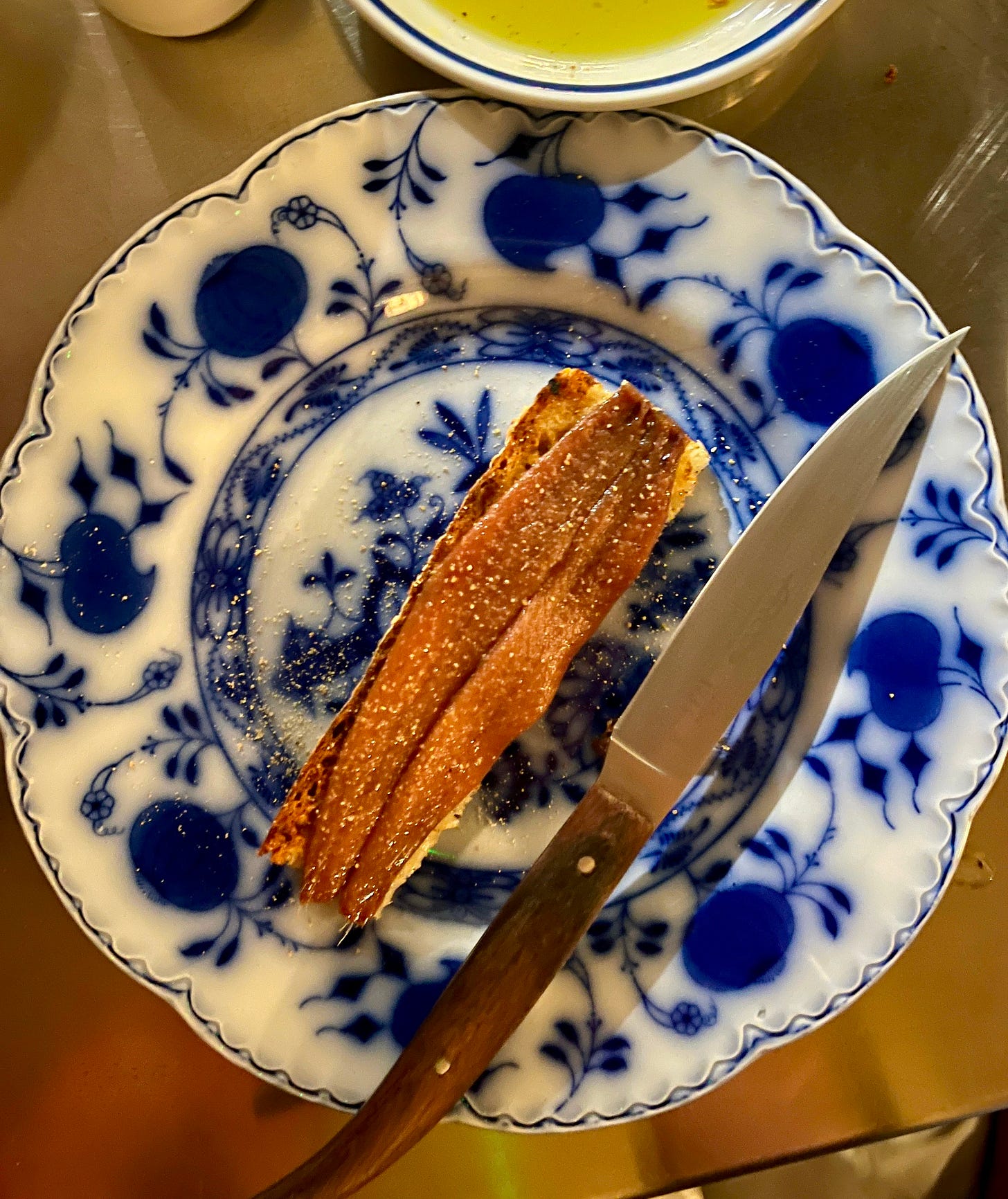Nataly Rodríguez Martí is changing Coruña's wine culture
How a restauranteur is bucking tradition in Spain's northwest corner.
Nataly Rodríguez Martí is a co-owner of restaurant and wine bar, 55 Pasos, in Coruña, Spain. I met Nataly when I dined at her restaurant in October, and I learned that despite Spain having some of the world’s most legendary producers, there are very few places to drink natural wine in town. We chatted about wine culture in a Coruña and how she’s getting more of her customers interested in natural wine.
Brianna Plaza: Tell me a bit about the restaurant.
Nataly Rodríguez Martí: My partner, Balazs, and I both got started in different parts of hospitality. I studied hospitality business management and he went to culinary school in Hungary and France. My ultimate goal was to be a F&B manager.
My first job was at an all-inclusive hotel in the Caribbean with a Spanish company, and eventually I moved to London, where I met Balazs. We then moved to Barcelona with the idea of doing our own thing, but the cost was so high. We moved to Coruña, where I’m from, to study the restaurant scene, then eventually we went back to London to run a restaurant that Balazs has previously worked at.
After about a year we were really ready to open something of our own. The location of 55 Pasos was originally the restaurant of a friend of my brother that he was just giving up. We had no money so we learned how to paint, how to drill, how to do everything on our own, and we had to move quickly to get open.
It was just Balazs cooking really good food and being spontaneous. We didn’t want to be attached to anything so if he wanted to cook Mexican, he cooked Mexican. It was a mess but it worked because it was our own thing.
We opened but had few clientele — it felt like no more than 100 people knew us in the first year. But they were coming so regularly that it was a challenge to always surprise them. Then the pandemic came when we had barely been open for a year. It was so hard but we managed because of our amazing and loyal clientele.
From then on, people got to know us and began sharing their experiences with friends and slowly we got more well known around the city.
Brianna Plaza: How did your background in beverage hospitality lead you to natural wine?
Nataly Rodríguez Martí: I mainly got interested in wine because of my father, he was always into wine. I started exploring a lot different wine and in university, I took some oenology courses and that opened me up a little bit. In London I did WSET 2 and 3 which gave me more of a background. I started drinking natural wine about eight years ago and I am still always learning. I meet a lot of people that say they don’t like natural wine, but it’s about trying a lot of producers. You need to try different grapes, different producers, different everything.
We’re always looking for new producers and traveling for wine. We’re rarely drinking the same thing because if I go somewhere, I want the sommelier to recommend something from a new producer or project that we don’t know. But for us, we’re not sommeliers. We love wine and we buy wine that excites us. There are a lot of people that don’t order wine because they get lost in a wine list or because they don’t understand what they’re reading. We speak simply to help them understand it all better.
Brianna Plaza: There’s so much natural wine in Spain, but there are very few places to drink it in Coruña. Why do you think that is?
Nataly Rodríguez Martí: At one point I do believe we were the only plaza where you could get natural wine in Coruña. We were coming from London and Barcelona and it was like, “Guys, this is a thing. You need to have natural wine and you need to open your mind to this kind of world.”
Mateo [owner of GLUGLU, another local natural wine bar] was one of our customers. Mateo travels a lot and so he got more into it, and then he opened GLUGLÚ. There are a few other places where you can find a natural wine, but it’s only a few bottles and they don’t often get new ones. You go there and it’s like, okay, I drank this already a few times. We change our list every few months.
But really, Coruña is the end of Spain. It was basically the last place for communications, trains, and planes. The people from Coruña are super traditional and they don’t like new trends in food or wine — they think they know everything. It can be a closed mentality. Thank god we have Inditex [fast-fashion giant, headquartered in the area] — it brought more people from abroad, which has started to open up the minds of people from here.
There’s an institute of wine in Galicia that sponsors winemakers from the state to go to university, but they don’t focus on natural wines because they think it’s too risky. So sommeliers from Galicia are being taught by people that don’t care for natural wine.
But people are demanding natural wine and that’s where the industry is going, so they’re going to need to shift their focus. But I do believe that’s why Coruña and Galicia are taking so long to come to natural wine — it literally takes years for the treads to arrive.
Brianna Plaza: How are you working to get more people in your community interested in natural wine?
Nataly Rodríguez Martí: If I have a winemaker in Galicia that is using sulfites, I will always give them a try. But I try and to tell them that they can make their wine without sulfites. I know the climate is humid but other natural wine makers also work in difficult climates, so it’s possible. I asked a winemaker to do a bottling without sulfites and we’ve kept it to show him how it’s aged, so this April we’ll open it together. It’s an exercise for him to understand his wines and learn that a natural production style is possible.
Last September we went to a harvest in Hungary with a winemaker who is just starting to come to Spain. He’s starting to become well known and people are starting to know his work — his wine is so, so good. I like to share the winemakers with people that come in.
With customers, we never start by saying it’s natural wine. Ever. I will start with something like a full-bodied wine that’s gotten a bit oaky over the years, maybe with a more traditional label. I will then explain to them that there are no chemicals in the vineyard or the winery.
It’s mainly showing them that natural wine is not just a trend. Sometimes it feels like you need to be a young, modern person that drinks wines with weird colors and smells. But really, you can drink a natural wine with your grandpa and it’s really just a wine that’s better for the environment and future generations. That’s how we need to think about it — it helps create better biodiversity.







I'm a long-time fan of natural wine, and this is a cool interview, Brianna! Interesting to hear how he works to combat this narrative of the "natty wine-drinker" with customers by leading with its tasting notes instead. Didn't occur to me that this perception of natural wine (and what kind of person drinks it) can turn folks off to it.